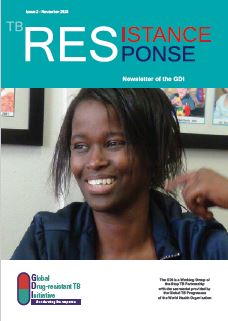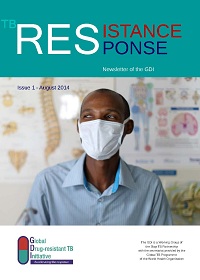Task Forces
- Taskforce for Patient-centred Programmatic Management of Drug-resistant Tuberculosis (PMDT) - (closed)
- GDI Triage Task Force - (active)
- Taskforce on Advocacy for PMDT - (closed)
- DR-TB STAT - (active)
- TB, Human Rights and the Law Task Force - (active)
TB, Human Rights and the Law Task Force
11 October, 2016
Objective
The TB, Human Rights and the Law Task Force was convened by the Global Drug-resistant TB Initiative in October 2016. The objective of the task force is to mainstream a human rights-based approach to TB and MDR-TB into national policies and programming. The approach aims to promote concrete actions that reduce human rights barriers to TB and MDR-TB diagnosis, prevention, and treatment and to improve the lives and health of all individuals affected by TB and MDR-TB. The task force will serve as a mechanism to foster meaningful collaboration and take collective action in addressing issues of human rights, TB (with a focus on MDR-TB), and the law.
Background
There has been a paradigm shift in global TB policy and practice, with a goal to eliminate all forms of TB by the year 2030. The End TB Strategy has at its core a program of patient-centered care that is grounded in a human rights-based approach to the entire spectrum of TB services. The third of four principles of the End TB Strategy calls for the "Protection and promotion of human rights, ethics and equity."
In spite of a stated global commitment to embracing human-rights driven TB policies and practices, there have been limited formal interactions between the medical/public health communities working on TB elimination and the legal/judicial/human rights communities. Such collaborations are essential given that there is frequent overlap between these areas when it comes to TB - especially multidrug-resistant forms of TB (MDR-TB) - where legal and human rights issues abound. Some examples of these include forced isolation and imprisonment of people living with the disease; discrimination in the workplace and in health care facilities; and lack of access to diagnostic and treatment services that limit an individual’s right to life and health.
Similar collaborations in the field of HIV have been extremely productive in ensuring that the legal, judicial, and human rights communities are informed by evolving medical and public heath practice and that medical and public health providers and policy makers are aware of the legal, judicial, and human rights implications of their work. These formal collaborations have also been essential in ensuring that persons living with HIV are able to access legal services and recourse when they face human rights barriers and violations. The End TB Strategy framework issued by the WHO demands that similar collaborations are developed and strengthened in the field of TB, with special attention given to MDR-TB, where many of these barriers are most acutely felt.
In order to make substantial progress in enshrining a human rights and an enabling legal environment for eliminating TB and MDR-TB, the TB, Human Rights and the Law task force aims to engage:
- Legal and human rights experts who can provide direct services to affected populations, move forward with TB-related litigation, and help inform the medical, public health, and policy communities about the potential legal implications and ramifications of their guidelines and practices.
- Judicial representatives who often hear cases involving TB and the law, are involved in interpreting international and constitutional law and public health implications of TB elimination practices, and who serve as activists promoting human rights in the area of TB.
- National governments and TB Programs who legislate medical, legal, and public health standards in the countries and communities.
- International donors and stakeholders, including the Global Fund, who are responsible for funding work on TB and MDR-TB elimination, have specifically espoused a human-rights framework for TB, and require input from accountable experts to ensure that all individuals affected by TB receive services that promote their human rights and liberties.
- Medical and scientific experts who are responsible for providing a sound empirical evidence base to inform the legal, judicial, and human rights communities about optimal diagnostic, preventive, and therapeutic services for persons with all forms of TB and whose medical and policy decisions must be informed by experts in the legal and judicial fields.
- Affected community members who often face serious human rights and legal barriers along the continuum of TB care and whose testimonies are essential in informing the judicial, legal, medical, human rights and public health communities.
- TB activists who often serve as a bridge between the different legal, human rights, judicial, medical and public health groups working on TB.
"Tuberculosis, Human Rights and the Law: A Compendium of Case Law" is designed to serve as an archive of case law involving tuberculosis, human rights and law from domestic and regional jurisdictions. The case law is summarized for convenience and use by readers and arranged based on broad thematic issues. The aim of the arrangement is to illustrate the international scope of the legal issues involved and to provide insights to readers in one jurisdiction about how cases have been adjudicated elsewhere.



